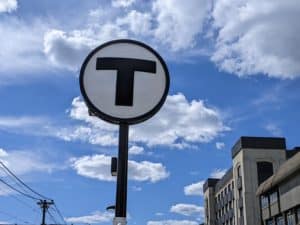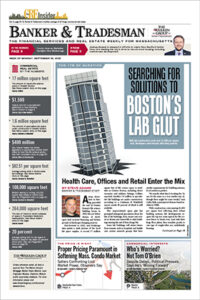MBTA officials for months have projected that a sizable operating budget gap – between $240 million and $421 million, depending on ridership – will erupt in fiscal year 2024, then grow worse in subsequent years. And in the wake of the FTA’s report, that outlook is “likely to get worse,” Betsy Taylor, the MBTA board’s chair, said during testimony on Beacon Hill Wednesday.
Taylor was testifying before the state legislature’s Joint Committee on Transportation as part of a marathon hearing digging into a scathing report on the T by federal safety investigators.
Committee co-chair Sen. Brendan Crighton asked Taylor if it was “safe to say” the MBTA’s estimated operating budget shortfalls will “grow significantly” larger once that project is complete, giving the MBTA a better handle on how many more employees it needs to add, and once the agency finishes an updated systemwide asset condition assessment.
Taylor replied that fiscal year 2024 “may not have as much of a fiscal problem” if hiring challenges persist — though that could pose “very real operational problems” — but otherwise, she said Crighton is right.
“Going beyond that, there will be a need for — the problem is likely to get worse,” she said.
The MBTA is not alone facing major staffing challenges, and many transit agencies around the country have also struggled to retain staff or have shifted service around to match the workforce.
Individual T workers feel the impacts, too. Tonee Hobbs, a 23-year veteran MBTA bus operator, told the Transportation Committee her job is “absolutely” tougher with a more depleted workforce.
“We don’t have enough drivers, and it shows all day,” Hobbs said. “Because we’re short drivers, it makes a difference in our workload and because we’re short drivers, it makes a difference for passengers.”
Jeb Mastandrea, an outside machinist and president of Machinists Union Local 264 Boston, linked staffing problems directly to safety concerns.
“We don’t have time to even do preventive maintenance because we spend our days putting out, what we call in the business, just putting out fires,” he said. “We don’t have time to do things to prevent things from happening. We’re just reactionary.”
MBTA Chief Financial Officer Mary Ann O’Hara said at T board of director’s budget committee meeting Thursday her team is still estimating the costs of fulfilling safety directives the Federal Transit Administration issued Aug. 31 in a scathing report.
“The four [directives] that were issued on Aug. 31 have not yet been sized,” O’Hara said. “We are working on that with the various teams, the operations teams and [new Chief of Quality, Compliance and Oversight] Katie Choe to come up with those numbers.”
MBTA General Manager Steve Poftak previously projected the FTA’s initial batch of findings published in June would require more than $300 million in spending, and O’Hara said officials are still trying to get a grasp on the financial implications of the final report.
“I think it’s so important to separate out as much as you can what the impacts are due to the directives so that we can have a better case to make to go back to the Legislature and the governor and request more money,” said MBTA board member Mary Beth Mello during Thursday’s meeting. “We all know it is going to take more money, and we can see that we have lots of other financial challenges.”
The state legislature and Gov. Charlie Baker have already approved tranches of one-time funding totaling about $666 million to help the MBTA make fixes required by the FTA, and Baker called for another $200 million in a closeout budget.
It’s already clear, though, that the T is headed for more than a one-time burst of spending.
In addition to the immediate fixes, the FTA warned that the MBTA may be 1,500 to 2,000 employees short of properly managing its current level of activity. Hiring that many people would represent expanding the T’s workforce by roughly a third, a major expense.
“We need to understand what the recurring costs would be,” MBTA Board of Directors Chair Betsy Taylor said at Thursday’s committee meeting. “As I read the report, given the increased levels of staffing required in order to maintain the desired level of safety and in order to develop the kinds of communications systems within the organization that are rightly requested, it’s got to cost more money, and that has absolutely nothing to do with the level of ridership. That’s just the nature of what’s being asked.”
“We do believe [The costs] to be material, in simple terms,” added MBTA Chief Administrative Officer David Panagore.
He said that the five-year budget estimates set to be released this fall will likely change once the T wraps up a workforce assessment the FTA required.







